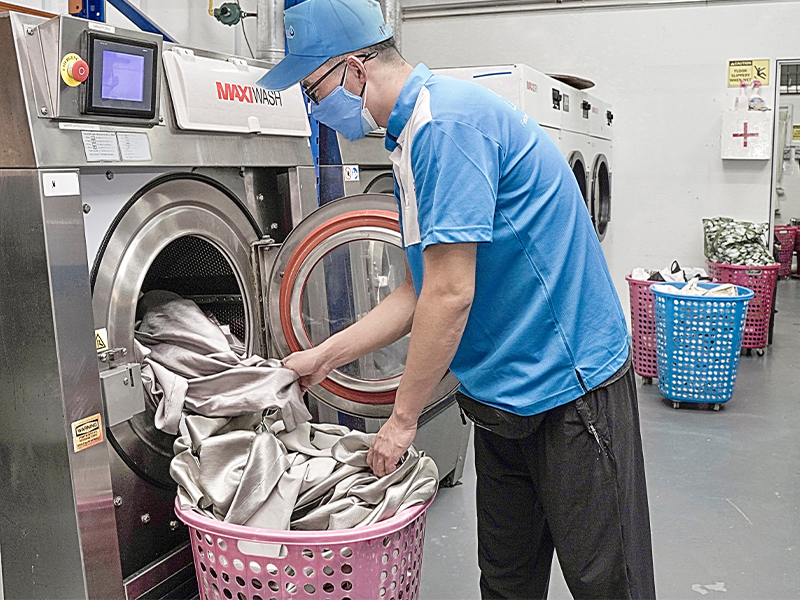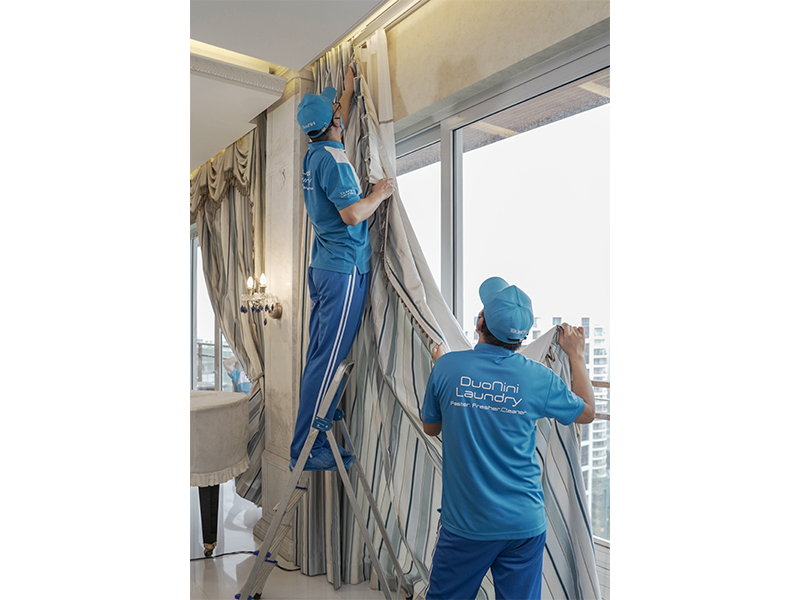What should you pay attention to when looking for someone to do your laundry, ironing service, curtain cleaning or dry-cleaning in Singapore? What kind of fabrics can and should be dry-cleaned? Read on for some facts and stats from Duo Nini, a dry-cleaning provider in Singapore.

What is dry-cleaning?
It’s a method of cleaning that uses liquid solvents to clean clothes or other fabrics such as curtains. (That’s right… dry-cleaning isn’t actually dry!)
Fun fact: back in the day, it was common practice to use flammable liquids such as gasoline, kerosene, benzene and petroleum as liquid solvents. Obviously, this is highly dangerous, and not at all an ideal situation.
All that changed in the 1930s, when synthetic, non-flammable solvents were developed. These became the new standard – and these are the same solvents that dry-cleaners today use.
How does dry-cleaning work?
The solvents get added when the clothes are being laundered. Instead of being drained and disposed (the way water is drained in a normal washing machine), the solvent gets re-circulated through filters several times, which helps to remove impurities that come loose during the cleaning process.
Compared to water, these solvents are much more adept at removing oily or greasy impurities in your clothes. On top of that, they don’t swell the fibres of your clothes the way water does.
Can you machine-wash or handwash fabric that says “dry-clean”?
Garments that need to be dry-cleaned will state this on their labels. Generally speaking, however, clothes made of silk, wool and suede need to be dry-cleaned. Evening wear and blazers also fall into the same category.
As to whether you can machine-wash an item that’s meant to be dry-cleaned, the answer is no. When you wash these items (regardless of whether it’s hand wash or machine wash), the water causes the fibres to swell and shrink, resulting in more wear and tear.
Best-case scenario: your clothing will have a shorter lifespan, and wear out more quickly compared to if you dry-clean. Worst-case scenario: doing a regular wash might ruin the fabric of your clothing, leaving it no longer wearable. For curtain cleaning, washing may cause them to shrink.
Can you skip dry-cleaning if your clothes don’t look dirty?
Every time you wear a piece of clothing, it comes into contact with pollutants (for example, dust, pollen, moisture, air pollution, fungus, bacteria and car exhaust smoke); plus, it’s normal for folks to perspire a lot in Singapore’s humid climate. So it’s better to do it each time. If you’ve worn an item only for a couple of hours, and in an air-conditioned environment, it might be fine to skip the dry-cleaning and do it next time instead.
What should you look out for when choosing a dry-cleaning or laundry service?
Not all dry-cleaners are made equal. So what should be top-of-mind when you’re choosing someone to dry-clean your clothes in Singapore? Most importantly, look for a business that owns its own factory and controls the entire dry-cleaning process.
For example, Duo Nini is a direct factory launderer; they own their own factory and operations, with no middlemen involved. All items that are sent to them get processed in-house, and they’re able to perform quality checks and ensure that the dry-cleaning is performed properly. Seven steps to cleaner clothes The Duo Nini team carries out a seven-step dry-cleaning process, which includes the following:

#1 Inspecting the item to ensure that there are no defects, heavy stains or foreign objects (such as coins, notes, tissues).
#2 Checking the label instructions to ensure that all washing instructions are followed. Duo Nini takes extra care to protect the delicate parts of your clothes (for example, the buttons and embroidered portions). They also separate coloured clothing from white clothing to avoid colour bleeding and staining.
#3 Treating clothes with sanitiser pre-wash.
#4 Washing – this is done using special detergent that doesn’t damage the fabric or harm the environment. The washing process helps to treat stains and kill any micro-organisms that may be present on your clothes.
#5 Treating the clothes with heat appropriately to further eliminate bacteria and viruses. (Don’t worry, the temperature for each item of clothing is adjusted based on the fabric’s heat tolerance!)
#6 Ironing, which is carried out by their trained crew.
#7 Packing, where your clothes are either hung on hangers neatly or folded into poly bags.
Laundry collection and drop-off by Duo Nini
For orders above $80, Duo Nini offers free collection and drop-off. Yep, they’ll come to your place to pick up your dry-cleaning and you won’t even need to step out of your door!
The company’s standard turnaround time is three days, although they do have an express service available where you can get your items in as little as three hours. The Duo Nini team works seven days a week including public holidays, so you won’t have to factor weekends in when planning your dry-cleaning schedule.
Duo Nini does curtain cleaning, laundry, dry-cleaning, and they provide ironing services as well.
For more on dry-cleaning in Singapore, check out duoninilaundry.com.sg for more details.
Duo Nini | FB @DuoNiniLaundry
If you’re planning to live in Singapore or if you’re new to our sunny island, then make sure to read the digital edition of our latest City Guide. We also have a list of home services, cleaners and more.
Don't miss out on the latest events, news and
competitions by signing up to our newsletter!
By signing up, you'll receive our weekly newsletter and offers which you can update or unsubscribe to anytime.



